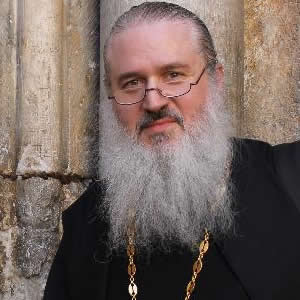In the name of the Father and of the Son and of the Holy Spirit.
Christ is risen! [Truly he is risen! Indeed he is risen!]
One thing I’d like to talk about very briefly is just how do we deal with difficulties that come our way. It’s been difficult for all of us to be separated, to be isolated, to not be able to come to the services. Even the clergy, we’re not able to come to all the services; we had to take turns because we have too many clergy. If all the clergy were here, we would have had very few people in the choir. And for the sake of the people who were listening to the services online, wanted the services to sound better rather than for the clergy just to be able to be here. And so this Pascha was the first Paschal midnight vigil that I was not present at church since I’ve been an Orthodox Christian, and that was a disappointment.
Many of you are in other difficulties. Many people have lost their jobs. But there’s nothing that can happen to you that can really harm you, St. John Chrysostom says. The only one that can harm you is you, because whatever happens in life, we have to accept it as something that God has allowed, and he’s allowed it for our salvation. That doesn’t mean that it’s a good thing, it doesn’t mean that we shouldn’t do anything to try to change our circumstances, but when we’ve done what we can do and yet the circumstances are nevertheless unpleasant or they’re difficult, we have to accept that God has sent this to us. How we respond to it is the one freedom that we have.
There was a Jewish—I think he was a philosopher; he might have been a psychologist—I can’t remember, but he was some kind of a scholar, and he wrote about what it was like to be in a concentration camp and why some people died and other people survived. He said many people just gave up because they couldn’t deal with what was going on. They gave up all hope, and they just died. Even though they were healthier than other people, there was no physical reason why they should have died before other people, but they just gave up hope. He talked about how, even when all your freedoms are stripped from you, you have one freedom left, and that’s how you respond. You could be tortured, you could be beaten, you could have all indignities that you could imagine brought upon you, but the one freedom that you still have is how you respond.
St. John Chrysostom tells us that whatever these problems are that we deal with in life, these could be the very things that bring us into the kingdom of heaven. These are things that could put crowns on our head, that make us saints. We don’t always know what’s going to happen next. We don’t always know what the future is going to hold. Many of us had very different plans for how Lent was going to go and how Holy Week was going to go, and then it all changed on us. We don’t know the future, but we can trust that God will get us through it, no matter what we go through. And that’s what we all need to do. We will get through this. It can all be for your benefit.
I know a great many people in the parish have learned a lot deal about the services than they would have learned just coming to the services, because they’ve done some of them at home. They’ve watched them online and they’ve followed along with the text when in the past they would have just been present, so there were things that they noticed that they didn’t notice before. Learning to pray better at home is something that we all should learn to do, and when this parish first began, we went for about a year and a half where most of the services that we did were reader’s services, and I can tell you from experience that reader’s services can be the most prayerful services that you’ll attend. I like having the full services; I like having the sacraments; I like having everybody here—but when you’re doing reader’s services, one thing that will not happen if you’re doing a reader’s service, particularly if you’re doing it alone, is your mind will not wander very easily, because you have to make it all happen, so you become much more engaged.
Well, we don’t know what the future holds. The day may come when that’s the only way you’re going to be able to pray. So take this opportunity. This was sort of a drill, you might say, for what may come in the future. Think about what you wish that you would have had on hand and you did not, and now begin to work on acquiring that. Think of all the things that you had wished that you had known about the services, and because you didn’t know them you weren’t able to do them as well as you would have liked to have done. And then now that you have the opportunity, work on trying to learn those things.
Let all of this be for your salvation, because if you make it for your salvation, if you respond in the way that God wants you to respond, if you learn what it is that he was trying to teach you and is continuing to try to teach you, it will be a blessing for you. Amen. Christ is risen! [Indeed he is risen!]

 Fr. John Whiteford
Fr. John Whiteford